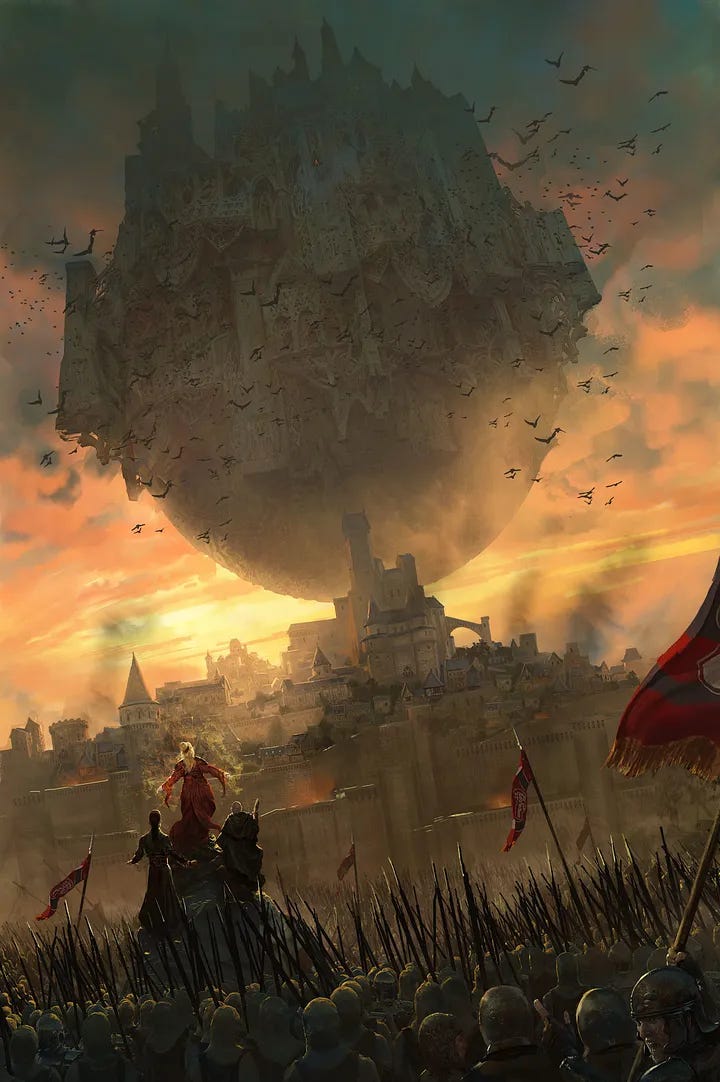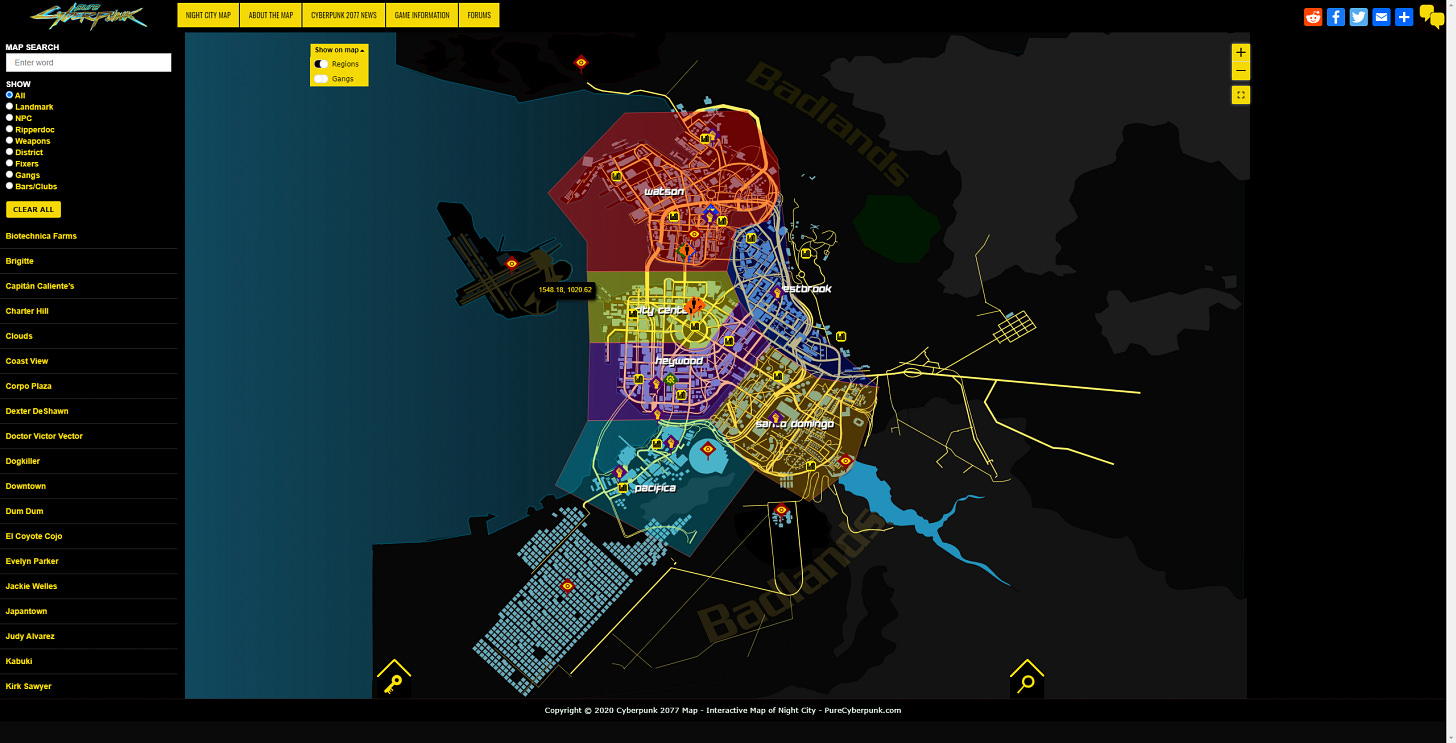CD Projekt Red released Cyberpunk 2077, the most anticipated game of 2020 and 2021, and set the entire open world extravaganza in a place called Night City.
Hundreds of people spent hundreds of thousands of combined hours to bring this game to life, filling out the lore, the history, the complex web of relations, and they went ahead and called it Night City.
Imagine if Tolkien called Lothlorien Elf Forest.
Now, I know where you think this is going, but I’m going to left turn us here. I could talk about hilarious examples of silly worldbuilding or worldbuilding that is so flimsy the slightest breeze causes it to topple, but I think there’s a more important point to be made.
Cyberpunk 2077 is set in Night City and no one cares.
No one cares that the name is dumb and seems like it was a placeholder that somehow made it to the final product. And the reason that no one cares is that people don’t actually want the big complex world that needs to be studied in order to be understood.
They just want a cool world where cool stuff happens.
I’ve written about worldbuilding as a trap too many authors fall into before. It’s a very common and understandable trap, honestly. You spent all this time (possibly months or even years, maybe even your whole dumb life) developing a place for stories to happen. One grand sandbox for your entire career to fit inside.
The problem begins when you think the reader needs to know the names of every grain of sand or what materials you used to hold the stupid thing together. All of that thought you put into it matters, no doubt, but it doesn’t matter to the reader.
Tolkien is famous for the depth and breadth of his worldbuilding. His son’s whole life’s work was revealing every little detail to the hungry crowd of nerds ready to gobble down mountains of invented garbage if it meant they could spend a few more hours inside Middle Earth, but what you may find most interesting about Tolkien’s actual novels is how little of this worldbuilding rises to the surface of the narratives.
It may be worth asking yourself why.
The truth about worldbuilding is that people want this world you made to become a blanket that they can wrap around their entire lives.
It’s why no one cares that Night City is called Night City or that Superman lives in Metropolis or that the Game of Thrones adaptation named the antagonist the Night King and his soldiers White Walkers.
Were more creative terms possible?
Almost certainly. Honestly, anything else would have made it feel more otherworldly.
But that’s kind of the point. The more fantastic the name, the more it becomes a barrier.
I recently saw some criticism of fantasy worldbuilding on TV that described it all as rather bland, dull, and samey, as if they all dipped their hands into the same generic bucket of TV tropes and just slopped it on the table for salivating nerds to slurp up.
The criticism went on to wonder if poor understanding of history led to this kind of worldbuilding1.
I think education is a possible issue here, but that's more because required history education only gets you so far. I feel as if I learned almost no history from the twelve years of compulsory education that I had and it wasn't until after university that I began to actually learn about history of any region of the world.
Would a better history curriculum solve this? Maybe, but probably not, because the students interested in history will dig it out on their own and the vast majority of students who don't find it interesting will never care that they only scratched the skin of the earth. Now, if we had better history teachers, that might make a significant difference, but that's also not exactly something you can policy or will into existence.
And let's even assume that history is taught and understood to some ideal - will that change this problem?
Most western fantasy is coded as medieval (specifically English medieval, honestly) and so people wouldn't really come across a wide variety of social or governmental structures. While there are differences between French, German, and English medieval social organization, it's not exactly super different. Even if we broaden it to the Middle East and even East Asia, we're still looking at a fairly rigid class structure with most avenues up from the bottom being related to education, military prowess, mercantilism, or clerical appointment.
Now, if we broaden things considerably and consider books like The Dawn of Everything by David Graeber, we come into contact with a lot of social variety. And while some dispute the claims made within the book, the book would be invaluable for someone wanting to write a more non-traditional fantasy world or story.
Steven Erikson, whose Malazan Book of the Fallen has become a modern cult classic (though it's also sold over 3 million copies, which ain't bad!), was trained as an anthropologist and archeologist before he joined the Iowa Writer's Workshop to get his MFA. His epic fantasy world reflects his training in that there is a deep sense of time as well as a wide variety of societies with various organizational and governmental systems present.
Fantasy is perhaps more diverse and popular now than it ever has been before, yet it largely remains just as narrow as it did 70 years ago. And I think the reason is actually quite simple: familiarity.
Despite fantasy fans claiming they want more diversity and a wider spectrum of stories than ones that happen in jolly ol' England, the books that people actually show up to buy tend to be much more similar to Game of Thrones than they are to Malazan Book of the Fallen.
Earthsea, for example, will never be as popular as Harry Potter or Lord of the Rings, despite being very well regarded and just as foundational to the genre as Tolkien.
And so familiarity is important. Especially with TV. People want to understand and feel at home in a world almost instantly. The longer it takes for people to get their bearings and feel solid ground beneath their readerly feet, the more likely they are to drop off before they get there. So most fantasy, whether books or TV/film, leans into a vaguely medieval British setting because then the reader feels at home with just a few broad gestures (there's an inn with ale, brown bread, and dark stew! men with big beards and swords! women bristling against a patriarchal order!) and can focus more on the characters and core mysteries to the world.
These mysteries and the lore tend to be where the familiar becomes bent or skewed so that people feel as if they're a part of something groundbreakingly original and new. Never mind that all the set dressing is interchangeable with dozens of other works.
This one has ice zombies!
Or elves that may be aliens!
Or maybe this medieval world is the distant future!
Another big problem is obviously just writing. Some of the most imaginative fantasy books I've read in the last decade are kind of sloppy. They're not bad, but they're also not great, which sometimes makes them feel more obtuse than they actually are. Most writers simply aren't Tolkien or Le Guin or George Martin and so they struggle to hold everything together. And this struggle of the author's often translates to readers who enjoy but don't love the work. Then, sadly, there are the many Martin wannabes who confuse killing characters for boldness, but this filled a huge market demand and so we got hundreds of not very good novels that were mostly marketed on their brutality. Some of these were good! Some had original worlds! But a lot of them were eyeroll inducing.
Most people simply cannot imagine a different world2. Most authors, despite what people may think, are not very smart or imaginative and so they can't even imagine a world different than the one we have, except by the inclusion of magic or dragons (never mind how this would shatter the rules of the very world they've created).
And even those who can pull that off run into the barrier that most readers actually just want to experience a world that's just like something they know but with magic or monsters.
I mean, go nuts with your worldbuilding. Make it weird and wild and everything you ever dreamt an imagined world could be, but then, when you go to write your story, remember that you’re fighting for people’s attention.
They’re a thumbswipe away from Netflix and porn.
Your job is to convince that theoretical person that they need to care about your story. You do this, first, by making them care about the people in the story.
Make it funny or heartbreaking, but make them care. Make them want to stick with you more than they want to watch Harry Potter or Bridgerton for the dozenth time or whatever kind of porn they’re into.
Give them people to love and a world that is an invitation. Seduce them into your world creation, morsel by morsel. If you keep them hungry, keep them wanting more, you can eventually give them that wondrous feast of worldbuilding that you’ve spent your whole sad life developing.
And they’ll thank you for it.
Fantasy has always been a genre about looking backwards at least as much as it looks forward, and so I’d say some understanding of history is essential to the genre. But you can use it more as scaffolding rather than the foundation. Which is to say: you don’t need to be an expert on any kind of history. You just need to be able to gesture well enough to temporarily fool the reader.
I mean, ask anyone to imagine a socialist or anarchist world rather than the one we have and many struggle to come up with anything.




